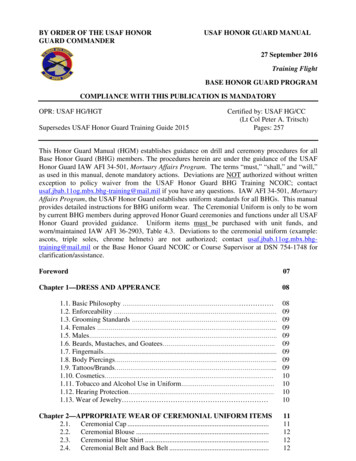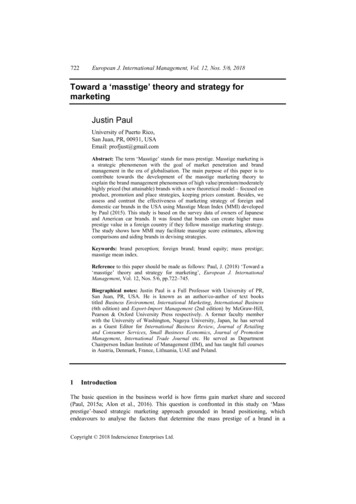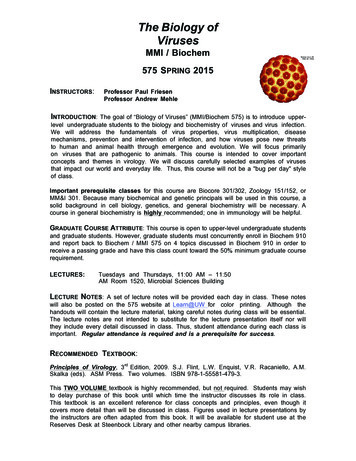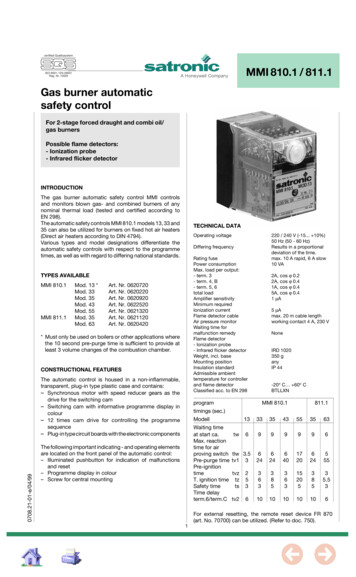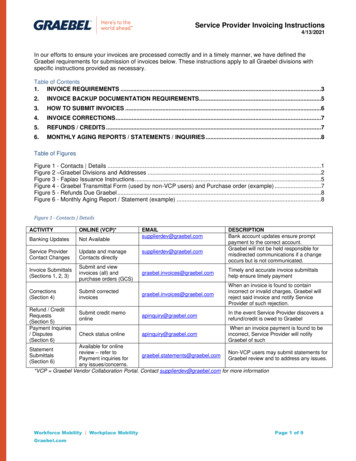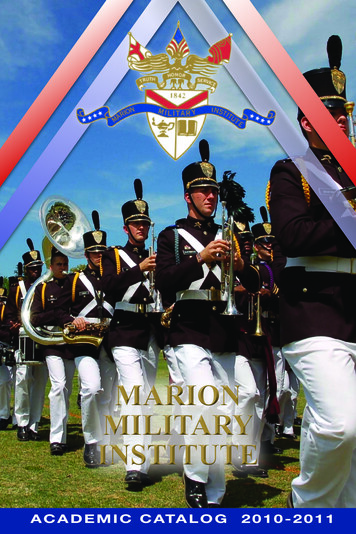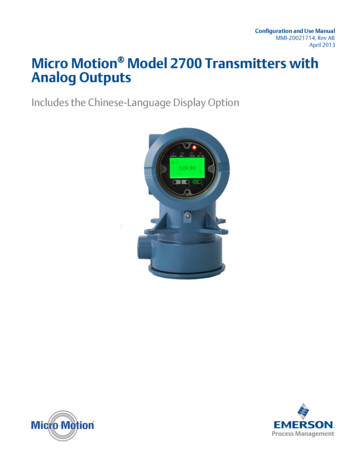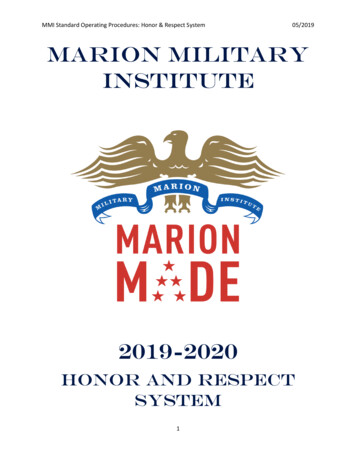
Transcription
MMI Standard Operating Procedures: Honor & Respect System05/2019MARION MILITARYINSTITUTE2019-2020Honor and RespectSystem1
MMI Standard Operating Procedures: Honor & Respect SystemHONOR & RESPECT SYSTEMTABLE OF CONTENTSCHAPTER 1: THE HONOR CONCEPTCHAPTER 2: HONOR COUNCILCHAPTER 3: HONOR REMEDIATIONCHAPTER 4: HONOR EDUCATION205/2019
MMI Standard Operating Procedures: Honor & Respect System05/2019CHAPTER 1: THE HONOR CONCEPT“A cadet will not lie, cheat, or steal.”(or tolerate those who do)1. THE HONOR CONCEPTMMI Cadets are persons of integrity; they strive to choose the harder right instead of theeasier wrong and are never content with a half-truth when the whole can be won. To be aleader, one must be completely trustworthy, for leadership is built on trust, and trust is builton honor.2. PURPOSEThe purpose of the Marion Military Institute Corps of Cadets is to develop leaders ofexemplary character. The Corps’ Honor Code is intended to foster a commitment to themoral and ethical excellence fundamental to that leadership development.3. THE HONOR OATHBy taking the Honor Oath, Cadets accept the responsibility to live by and uphold the HonorCode and will be held accountable for violating any precepts of the Honor Code.“I will embrace the ideals of truthfulness, fairness and respect for myself and others.Likewise, I resolve to do the right thing daily as a means to live an honorable life, (so helpme God).”4. GOALS OF THE CADET HONOR CODEThe goals of the Cadet Honor Code are that cadets: Learn and practice the essential leader responsibilities of establishing a healthy ethicalclimate within their organizations and lives. Develop an understanding of the importance of integrity as an essential aspect ofleadership. Foster a desire to maintain an honorable lifestyle in the Spirit of the Code. Achieve the level of commitment to honorable conduct necessary to prepare them forgreater challenges to their integrity throughout a lifetime of service. Develop the character required of those who voluntarily take full responsibility for theirdecision and actions.3
MMI Standard Operating Procedures: Honor & Respect System 05/2019Be moral-ethical examples worthy of emulation.5. PRECEPTSa. The Cadet Honor Code represents the minimum ethical standard to which all cadets areexpected to adhere. The Corps operates under the assumption that those who enter ithave already been instilled with a basic set of core values. It is expected that all cadetswill strive to live far above the minimum ethical standard defined by the Cadet HonorCode, that each cadet will develop a high personal sense of honor within the Spirit of theCode, and that a cadet’s statements and actions must always represent the complete truthand an adherence to the Spirit of the Honor code and not just the letter of the law.b. The code is expressed as a series of prohibitions: “A cadet will not lie, cheat or steal”. Itis a simple standard to live by, yet it demands strict compliance. Cadets should always bestriving to achieve the highest standard of ethical performance. The essence of the code isthat each cadet must commit themselves to a constant effort to live above the commonlevel of life, far exceeding the minimum standard of ethical behavior.c. To ensure the minimum standard of the Cadet Honor Code is maintained, enforcementand education are integral parts of the Honor System. Together, these challenge thecadets to live above the Code and allow the Code to achieve its ultimate objective –ensuring that graduates of Marion Military Institute’s Corps of Cadets are honorablewomen and men who are leaders of character.6. THE SPIRIT OF THE HONOR CODEa. To understand the ideal that cadets should strive for, they must embrace the “Spirit ofthe Code”. This spirit marks true leaders of character and goes beyond the simpleadherence to rules. The Spirit of the Code comes from deep within truly honorablemen and women through their expressed actions and demonstrated integrity. Tothose who accept and adhere to the Spirit of the Code, it is a way of life, not a laundrylist of restrictions.b. Cadets of integrity strive to live by the Spirit of the Code. For any action, they willalways ask themselves if it is the right thing to do.c. This concept embodies the meaning of each of the tenets of the Code itself:i. The Spirit of the Code embraces truthfulness in all its aspects. Cadets tell thetruth and ensure the full truth is known. Cadets do not lie.ii. The Spirit of the Code calls for complete fairness in all relationships. Cadetsensure that work submitted as their own is their own, and that assistancereceived from any other source is authorized and properly documented.Cadets do not cheat.4
MMI Standard Operating Procedures: Honor & Respect System05/2019iii. The Spirit of the Code requires respect for other people and their property.Cadets do not steal.iv. The Spirit of the Code demands that ethical standards and personalcommitments be maintained at all times to ensure an ethical environmentexists. Cadets do not tolerate or promote violations of the Code. A cadet’sfirst loyalty is to maintaining the Honor Code, and this loyalty transcends unit,class or friendship.v. Cadets exemplify the Spirit of the Code by exceeding the minimum standards,holding the code as the standard to be maintained and not as a system oflimitations or restrictions.7. THE TENETS OF THE CODEa. To violate the Honor Code, the accused cadet must have lied, cheated, stolen, attemptedto do so, or tolerated such action on the part of another cadet. These actions apply bothon and off duty and are not constrained by any geographical or school boundaries. Acadet who truly embraces the Spirit of the Code will always maintain proper demeanorand professionalism. Intoxication or other outside influences are not excuses forunethical or dishonorable conduct or actions.b. LYING. Lying is making a false statement in any format (oral, written, or by gesture)with the intent to deceive or mislead. A cadet’s word is a pledge that his/her statementsare the truth without reservation. Oral or written reports, required within the context ofcadet management and accountability, are official statements and must be complete andaccurate. Lying includes employing technicalities, or making evasive or misleadingstatements to conceal guilt. Removing or altering official records is considered a form oflying under the Code. Other forms of lying may include obtaining leave authorization onfalse pretenses, signing out to a false location, knowingly signing in or out with anincorrect time, signing in for another cadet, or possession of false identification. It ispossible to make a false statement in haste and without premeditation or thought. If acadet makes such a statement, he/she must immediately correct the mistake. Suchresponses are considered “pop off” answers and, if immediately corrected, are normallyexcused. Likewise, reports or statements made in error and realized later to be false areexcusable only if corrected in a timely manner upon realization of the error. To let amistake go uncorrected is to allow a false statement to stand as the truth and is an honorviolation.c. CHEATING. Cheating is attempting or aiding in the attempt to receive undeservedcredit or to gain unfair advantage. It is to defraud or mislead. Any work done for a grademust be done without another person’s help unless specifically authorized by theinstructor. A cadet must never copy another cadet’s work or compare answers during agraded exercise. Such exercises may include homework, laboratory reports, essays, or5
MMI Standard Operating Procedures: Honor & Respect System05/2019any other oral or written work submitted for grade. Cheating is also having priorknowledge of examination questions by means not sanctioned by the instructor so as togive unwarranted advantage over other classmates. In writing essays and themes, it isoften necessary to use the ideas and words of others. Plagiarism is the use of ideas orwords of another as one’s own without giving the original source of the idea or writingcredit. The intent to deceive is assumed by the act of plagiarism and is a violation of theCode.d. STEALING. Stealing is the taking or wrongful possession of property without theknowledge or consent of the owner. Stealing involves the intent to permanently deprivethe owner of his/her property. The intention to return property borrowed without theowner’s knowledge is difficult to prove. Cadets are not to borrow items withoutpermission of the owner. The unauthorized use of school or another’s equipment such astelephones, copy machines, computers, or vehicles may be considered stealing.e. ETHIC OF NON-TOLERATION. Cadets who observe a possible honor violationshould approach the suspected violator and ask for an explanation. If it is determined acadet may have committed a violation of the Honor Code, the incident should be reportedto any Honor Council member for investigation. Cadets can also report suspectedviolations to the Honor Council Advisor, Commandant of Cadets and/or TACs.f. ENTRAPMENT AND SELF-INCRIMINATION. No cadet or member of the MMIfaculty or staff will employ the Honor Code in such a manner as to entrap or force a cadetinto an admission of guilt. Cadets in doubt as to the interpretation of any specificrequirement of the Honor Code or its application in a particular circumstance are to seekclarification from the Cadet Honor Council Advisor.8. INTENT. An important element of the Honor Code is intent. Cadets who violate the HonorCode have the necessary state of mind - the intent to deceive, the intent to gain unfairadvantage, the intent to deprive, or the intent to wrongfully permit. If the intent to committhe act is present, then the fact that may fail in their attempt does not exonerate them. Theconcept of intent is not meant to “narrow” the scope of an alleged honor violation, butinstead to “expand” it to include consideration of how the act, successful or not, revealsintent to violate the code and gain an unfair advantage.9. REGULATIONS AND HONOR.a. Do not confuse the two separate and distinct standards comprised in the Honor Code andthe MMI Corps of Cadets Rules and Regulations. The Honor Code represents theminimum ethical standard by which all cadets are expected to conduct themselves.6
MMI Standard Operating Procedures: Honor & Respect System05/2019Regulations, on the other hand, are standards of conduct and discipline against whichcadets are held responsible. Cadets should always maintain high standards, but violationsof regulations are not necessarily violations of the Honor Code. Questions concerningany ambiguity should be addressed to the Company Honor Education Officer or anyHonor Council Member.b. Cadets in leadership positions will refrain from using the Honor Code as a means toenforce or provoke violations of Cadet Rules and Regulations. This can be determined tobe entrapment and an abuse and not admissible in Honor Court proceedings.10. HONOR CODE VIOLATIONS. The Honor Council will ultimately investigate and, asnecessary, prosecute all violations of the Honor Code with most cases following one of twopaths: In cases of academic cheating the case will be referred first to the Chief InstructionalOfficer (Dean) for internal adjudication and any appropriate academic penalties. In casesconcerning non-academic cheating, lying, stealing or non-toleration, the case will generallybe referred to the Commandant of Cadets for appropriate disciplinary action based onviolation of rules or regulations. The Honor Council may consider cases concurrently withthe Dean or Commandant’s processes or wait for their determination before continuing withthe case. Time, availability of witnesses etc. will dictate the sequence of this procedure.7
MMI Standard Operating Procedures: Honor & Respect System05/2019CASES OF ACADEMIC CHEATINGAccusation ofcheatingreported altyCaseforwarded toCommandantfor anyviolations ofrules orregulationsCaseforwarded toHonor Councilfor HonorViolation(Cheating)CASES ORIGINATING AS DICIPLINARY ISSUES THAT INCLUDE POSSIBLEHONOR CODE VIOLATIONS8
MMI Standard Operating Procedures: Honor & Respect SystemAccusation ofbreach ofCadet RulesandRegulationsreported toCommandantInvestigation anddeterminationmade on rulesviolations possible violationof Honor Codenoted byCommandant05/2019Case referred toHonor Councilfor investigationof possibleHonor Codeviolaton.CASES OF HONOR CODE VIOLATIONS REPORTED DIRECTLY TO THE HONORCOUNCILAccusation of HonorCode Violation reportedto Honor CouncilInvestigation, Hearing,DeterminationCase may also bereferred to Commandantshould violation of rulesor regulations beindicatedCHAPTER 2: THE CADET HONOR COUNCILMARION MILITARY INSTITUTE9
MMI Standard Operating Procedures: Honor & Respect System05/2019HONOR COUNCILCHAIRVICE CHAIRSCRIBE/SGT atARMSHONORREMEDIATION/EDUCATIONOFFICERSPECIAL MEMBERSINVESTIGATORSCOMPANY HONORand RESPECTEDUCATIONOFFICERS1. Duties and ResponsibilitiesChair. Responsible for the conduct and functioning of the council in all matters. Direct liaisonwith the faculty advisor.Vice Chair. Responsible to assist the Chair with all matters pertaining to the functioning of thecouncil. Assumes duties as the Chair when required.Scribes/Sergeants at Arms. Responsible for maintaining a written and/or recorded record of allcouncil activities. Responsible for the secure and orderly conduct of honor council meetings andhearings.Cadet Honor Remediation/Education Officer. Assists the Faculty Honor Remediation Officerand Staff Advisor. Responsible for the planning and conduct of the Honor Education Program inthe Corps of Cadets.Company Honor Education Officers. Company Honor Education representatives who assistthe Cadet Honor Education Officer. Responsible for conducting honor education programswithin their respective companies and serving as the first line for cadet inquiries on honor issues.They are non-voting members of the council.10
MMI Standard Operating Procedures: Honor & Respect System05/2019Investigators. Responsible for conducting informal and formal investigations of reported honorviolations.Special Members. Corps Battalion Commander and Command Sergeant Major. Serve as nonvoting members of the honor council to represent the interests of the cadets and overall Corpsduring honor council deliberations.Faculty Advisor. Is appointed by the President of MMI. The advisor has no vote in HonorCouncil proceedings, but may be consulted at any time. The advisor or a faculty representativewill be present at all proceedings to insure due-process. The advisor may take appropriateactions deemed necessary to ensure due-process rights are respected and the council followsappropriate procedures.2. VacanciesChair, Vice Chair, Scribe/Sergeant at Arms, Cadet Honor Remediation/Education Officerand Investigators. Nominations/applications for these positions will be accepted from theCorps of Cadets at large. Nominations/applications will be screened/finalized by the FacultyAdvisor before being voted on by the council members.Company Honor and Respect Education Officers. These non-voting members will beselected in accordance with Chapter 4, para 5.b.General Eligibility Requirements.-Members of the Honor Council must have a 2.5 GPA at MMI or their high schooltranscript if they are a C-1.Nominations/applications will be screened by the faculty advisor for satisfactoryacademic and disciplinary standing at MMI.A previous finding of guilty for any Honor Code violation excludes the Cadet fromconsideration.Dismissals from the Honor Council. Council members may be dismissed or suspended fromthe council for poor academic or disciplinary records, Honor Code violations, or unsatisfactoryperformance on the council. Suspension decisions will be made by the faculty advisor inconsultation with the Commandant of Cadets. Dismissal proceedings require a 2/3’s vote fromthe council members and will be approved/disapproved by the faculty advisor in consultationwith the Commandant of Cadets.3. Honor Court Procedures – Pre-HearingThis section defines the Honor Court procedures for the Marion Military Institute (MMI) Corpsof Cadets. Any changes to procedure or process must be approved by the Honor Council Chairand Faculty Advisor.11
MMI Standard Operating Procedures: Honor & Respect System05/2019Officers of the Honor Court. The voting officers of the Honor Council shall also be the officersof the Honor Court. Each officer shall perform the respective court duties prescribed in thismanual.Order of Pre-Hearing Procedures. Pre-trial procedures shall be followed in the chronologicalorder outlined in the succeeding paragraphs.Reporting a Violation. Cadets who know, or believe they know, of a violation of the HonorCode will report the violation in person immediately to their Company Honor Education Officer,any Honor Council member or a staff/faculty member. Any cadet who has unintentionallyviolated the Honor Code must report this to their Company Honor Education Officerimmediately upon discovery of the violation. (Staff and faculty members will report Honor Codeviolations to the Honor Council Faculty Advisor).Action by the Recipient of the Reported Violation. The Honor Council member who receives thereport will make every effort to ensure that they collect all immediately available evidence, toinclude written statements, names of witnesses and physical evidence where pertinent. TheHonor Council member will present this information immediately to the Honor Council Chairwho will consult with the faculty advisor. If both determine that the evidence warrants furtheraction the Honor Council Chair will assign a minimum of two investigators to the case and setdeadlines for reporting back to the council with their initial findings.Action by the Investigating Officers. The Investigating Officers will immediately inform theaccused of the purported violation and advise the accused of their rights as stated in the CadetManual. They will also inform the accused of the timeline of the investigation and be given anopportunity to make a formal statement. The investigators will present their preliminary findingsto the Honor Council who will vote to: 1) bring the accused to a hearing to face the charges, 2)offer the accused a remediation program, 3) refer the case back to the investigating officers forfurther investigation, or 4) drop the charges.4. Honor Court Procedures – HearingNotification and Preparation. The Chair will appoint two honor council members as Escorts.The Escorts will inform the accused cadet that a formal hearing will be conducted. They willprovide the accused with written notification which will include the date, time and place of thehearing, the prescribed uniform and the accused’s rights during conduct of the hearing. Theaccused will be given a minimum of two days to prepare for the hearing.Delays. The faculty advisor can delay a hearing if it is determined that the accused hadinsufficient time to prepare or has an excused absence. However, the self-inflicted lack ofpreparation on the part of the accused is not sufficient grounds for a delay.Hearing. The hearing will normally be held in the Honor Council Room. Escorts will beassigned to ensure the accused reports to the hearing at the right time, place and in properuniform. The hearing will conform to the outline on the following page:12
MMI Standard Operating Procedures: Honor & Respect SystemHEARING PROCEEDURES1. ALL HONOR COUNCIL MEMBERS WILL REPORT TOTHE HEARING ROOM NLT 15 MINUTES PRIOR TO THEHEARING. ACCOUNTABILITY AND OTHERADMINISTRATIVE ISSUES WILL BE CONCLUDED.2. ESCORTS WILL ENSURE THE ACCUSED IS PRESENT.3. THE SERGEANT AT ARMS WILL INSTRUCT THEACCUSED TO ENTER THE HEARING ROOM ANDREPORT TO THE CHAIR.4. THE SCRIBE WILL READ THE CHARGES.5. THE ACCUSED WILL HAVE AN OPPORTUNITY TOMAKE AN INITIAL STATEMENT.6. THE ACCUSED CAN CALL AND EXAMINE DEFENSEWITNESSES. TRIAL COUNSEL WILL HAVE ANOPPORTUNITY TO CROSS EXAMINE.7. TRIAL COUNSEL WILL CALL WITNESSES. THEACCUSED WILL HAVE AN OPPORTUNITY TO CROSSEXAMINE8. VOTING MEMBERS WILL HAVE AN OPPORTUNITY TOQUESTION THE ACCUSED.9. THE ACCUSED WILL BE PROVIDED THEOPPORTUNITY TO MAKE CLOSING REMARKS.10.THE SERGEANT AT ARMS WILL ESCORT THEACCUSED TO THE WAITING AREA TO AWAIT THECOURTS DETERMINATION.11.THE SERGEANT AT ARMS WILL DIRECT THEACCUSED TO RETURN AND REPORT TO THE CHAIRTO RECEIVE THE DETERMINATION OF THE COURT.12. THE CHAIR WILL READ THE DETERMINATION OFTHE COURT, ADVISE THE ACCUSED THAT THERECOMMENDATIONS WILL BE FORWARDED TO THECOMMANDANT FOR DICIPLINARY ACTION ANDTHAT THE ACCUSED HAS A RIGHT TO APPEAL.13.THE SERGEANT AT ARMS WILL ESCORT THEACCUSED FROM THE HEARING ROOM.1305/2019
MMI Standard Operating Procedures: Honor & Respect System05/2019Duties of Members of the Honor Court. Voting members of the Honor Court hear the evidenceand determine the guilt or innocence of the accused. Each member sitting on the court shall havean equal voice and vote with other members in deliberation upon and deciding all questionssubmitted to a vote or ballot. The Chair will have no greater rights in such matters than anyother member. Members shall be dignified and attentive at all times. Members will be in theappropriate uniform and present a sharp, professional appearance. The Chair will only vote incase of a tie vote.Investigating Officers as Trial Council. The investigating officers appointed to the case willserve as trial council. They shall prosecute the accused in the name of the Marion MilitaryInstitute Corps of Cadets. Other investigating officers can be appointed to assist as necessary.Voting. Each voting member of the court present MUST vote on any question or determinationtaken by the court. No voting member may abstain from voting. A quorum of 8 voting membersmust be met to hold votes.Findings:---In assessing a specific act to determine whether it was a violation of the Honor Code, itmust be determined that there is reason to believe the violation occurred with “clear andconvincing evidence.” This means that the conclusion of guilt is not a guess, suppositionor conjecture. This does not mean the court requires absolute certainty, just that proofexists that precludes every reasonable hypothesis except guilt.A guilty determination requires a finding of guilty by at least 50% 1 of voting memberspresent. Findings will be limited to “guilty” or “not guilty”. The Chair will be responsiblefor counting the votes and announcing the verdict.In cases where the circumstances are considered sufficiently extenuating, the Court mayconsider offering remediation. The vote to recommend remediation will be conducted inthe same manner as the previous paragraph except that the members will vote“remediation” or “no remediation”. The Chair will only vote in case of a tie.Announcing the Findings. The Chair shall announce the findings of the Honor Court inclosed session. Prior to such announcement the Chair will ensure that the followingpersonnel are present: all voting members of the court who sat on the case, the trial counsels,the accused and their counsel, and the faculty advisor.Action in Case of Findings of Not Guilty. If the accused is found “not guilty”, all records ofthe trial will be destroyed. Only the final determination decision will be kept for record.Action in Case of Findings of Guilty. If the accused is found “guilty”, and norecommendation/offer of remediation is made, the Chair will advise the accused that thefindings and recommendations will be forwarded to the Commandant for appropriate actionand that their right to appeal is provided for in the Cadet Manual.Appeals:14
MMI Standard Operating Procedures: Honor & Respect System05/2019a. Cadets who have a reason for requesting an appeal may petition the Commandantwithin five business days stating in the petition the grounds upon which they arebasing their argument for redress.b. There are three possible grounds for appeal:a. New evidence, available since the Honor Council hearing, which wouldindicate the findings of the Court are in error.b. Evidence that the cadet’s rights were not protected, jeopardizing the cadet’sright to a fair and impartial investigation and hearing.c. An error in the trial proceedings of such magnitude as to jeopardize thefairness of the hearing.c. The Commandant will issue further guidelines for the appeals process.15
MMI Standard Operating Procedures: Honor & Respect System05/2019CHAPTER 3: HONOR REMEDIATION1. HONOR REMEDIATION. Honor remediation is a developmental program that focuses onthe moral development of MMI cadets who have committed a dishonorable act but who theHonor Council deems, through mitigating circumstances, would benefit more from this programthan to receive penalty hours, suspension or dismissal. The end-state is to have the cadetunderstand and confident they can “choose the harder right” on their own.2. REMEDIATION PROCESS. After the Honor Council reviews an allegation of violation ofthe Honor Code, it may vote to offer the accused entry into a remediation program. The accusedhas the right to accept or refuse this offer. Entry into the program does not imply guilt orinnocence. Upon successful completion of the program the accused’s case will be archived.Should the accused be brought up on an Honor violation after successful completion of theremediation program, the original case will be re-opened. Should the accused not complete theremediation program successfully, the Honor Council will proceed with the case on the originalallegations.Allegation Submittedto Honor CouncilReviewPreliminaryInvestigationReviewFormal InvestigationReviewHearingFindings &Recommendationsforwarded toCommandant16
MMI Standard Operating Procedures: Honor & Respect System05/20193. HONOR REMEDIATION PROGRAM.a. The length of remediation is normally set at 4 weeks.b. The accused will sign a contract with the Faculty Honor Remediation Officer whichoutlines the accused’s responsibilities during the remediation period.c. Honor Remediation will be successfully completed when the Faculty HonorRemediation Officer determines that the cadet has successfully met all requirements setforth in the contract and that the cadet has had no subsequent disciplinary or negativeacademic actions taken against him/her. The Remediation Officer will prepare aCompletion of Honor Remediation Report and forward it to the Chair of the HonorCouncil.d. Honor Remediation may be terminated at any time during the four weeks if the FacultyHonor Remediation Officer determines the cadet has failed to meet any of therequirements, violated any sanctions, or committed honor or conduct infractions duringthe remediation period. The Remediation Officer will prepare a Failure of HonorRemediation Report and forward it to the Chair of the Honor Council. This report willclearly state the reasons supporting the decision to fail the cadet.e. On receipt of the Honor Remediation Report the Chair and Faculty Advisor will meetwith a quorum of the Honor Council to consider the recommendations and vote on finaldisposition of the case.f. At a minimum, the Remediation Program includes weekly meetings with theRemediation Officer, daily written reflections, weekly informal interviews, weeklyreadings, and a written paper at the conclusion of the program.4. EARLY INTERVENTION (EI) HONOR REMEDIATION PROGRAM.a. The purpose of the Early Intervention Honor Remediation Program is the same as thefull remediation program, but is conducted at the Company level for cadets that commitminor Honor Code violations.a. The length of remediation is normally set at 2 weeks under the supervision of theCompany Honor and Respect Education Officer (CHRO).b. The accused will sign a contract with the CHRO which outlines the accused’sresponsibilities during the remediation period.c. Honor Remediation will be successfully completed when the CHRO determines thatthe cadet has successfully met all requirements set forth in the contract and that the cadethas had no subsequent disciplinary or negative academic actions taken against him/her.The CHRO will prepare a Completion of Honor Remediation Report and forward it to theChair of the Honor Council.d. Honor Remediation may be terminated at any time during the two weeks if the CHROdetermines the cadet has failed to meet any of the requirements, violated any sanctions, or17
MMI Standard Operating Procedures: Honor & Respect System05/2019committed honor or conduct infractions during the remediation period. The CHRO willprepare a Failure of Honor Remediation Report and forward it to the Chair of the HonorCouncil. This report will clearly state the reasons supporting the decision to fail thecadet.e. On receipt of the Honor Remediation Report the Chair and Faculty Advisor will meetwith a quorum of the Honor Council to consider the recommendations and vote on finaldisposition of the case.f. At a minimum, the Remediation Program includes weekly meetings with theRemediation Officer, daily written reflections, weekly informal interviews, weeklyreadings, and a written paper at the conclusion of the program.18
MMI Standard Operating Procedures: Honor & Respect System05/2019CHAPTER 4: HONOR EDUCATION1.PURPOSE. Before cadets can exercise stewardship of the Cadet Honor System andinternalize the spirit of the Honor Code, they must understand the concepts that underlie them.2.OVERVIEW. The Honor Education Program is a collaborative effort between theCenter for Leadership, Commandant, Academic Dean and Athletic Director. The HonorEducation Program provides the conceptual and inspirational content to support the individualand collective development of Cadets into leaders of character. This program is encompassingthe professional and ethical standards of behavior for Marion Military Institute. MMI cadets putthese standards into practice through their participa
No cadet or member of the MMI faculty or staff will employ the Honor Code in such a manner as to entrap or force a cadet into an admission of guilt. Cadets in doubt as to the interpretation of any specific requirement of the Honor Code or its application in a particular circumstance are to seek clarification from the Cadet Honor Council Advisor. 8.


